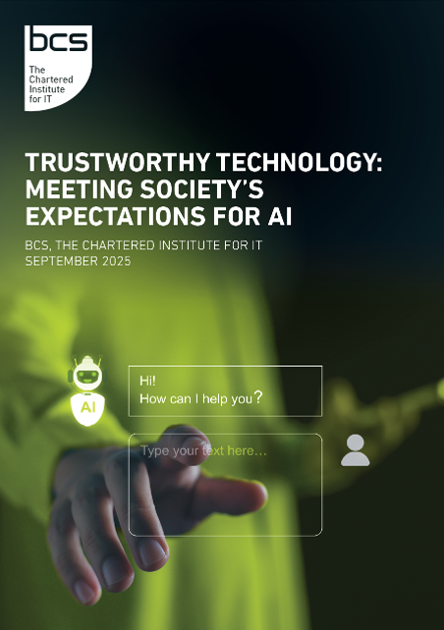The public expect tech professionals to be publicly registered and meet a code of conduct, BCS research finds.
As the UK accelerates its adoption of artificial intelligence (AI) across public services, how can we ensure that the systems shaping our lives are trustworthy, ethical and accountable?
A new report from BCS, The Chartered Institute for IT, drawn from a nationally representative YouGov survey of over 2,000 UK adults, reveals overwhelming public support for professional registration of the technology workforce, particularly those working in high impact AI roles.
The findings suggest that the public expect the people behind our digital infrastructure to be proud to meet similar standards of competence and ethics as, for example, doctors, lawyers and accountants.
What do the public think?
The BCS-commissioned YouGov survey shows clear demand for professional accountability across technology roles:
- 85% of respondents agreed that IT professionals working on systems that affect the public should be required to join a public register and follow an independent code of conduct, like doctors or lawyers
- 82% believed that IT professionals working in high-impact AI roles should be professionally registered and held to independent standards of competence and ethics
- 75% said they would trust an IT professional more if they were listed on a public register and accountable to a code of conduct
- 50% said that an independent body, such as BCS, should be responsible for upholding ethical and technical standards
These data reflect a growing demand for transparency, accountability and ethical leadership in the tech sector, particularly in roles that affect people’s lives directly.
BCS’ recommendations for trustworthy AI
Following these results, BCS offers several recommendations:
- Professional registration and code of conduct: professional registration, underpinned by an accompanying code of conduct, should be an essential condition for all public sector technology roles — including contractors within the supply chain — to ensure accountability and reinforce public trust
- Public register for high impact roles: a public register of IT professionals would provide assurance and accountability in high impact roles including automated decision making or handling special category data. It would ensure IT professionals are accountable to independent standards of ethics and competence and are working towards regular and published continuing professional development (CPD) goals, including chartered status
- Leadership in ethical standards: The Department for Science, Innovation and Technology (DSIT) should continue to lead in bringing UK companies and professional bodies together to set and develop ethical standards. This will be key to building public trust and accountability in AI and digital systems
Sharron Gunn, CEO of BCS, The Chartered Institute for IT added: ‘As the professional body for computing, our role is to champion the highest standards on behalf of both our members and the public. This research shows the value to society of IT professionals who are proud to be accountable, competent, and to follow a clear code of conduct.
‘For our members, that’s exactly what professional registration and chartered status represent. By embedding these principles across the public sector and beyond, we can help ensure that AI and digital services work in a way that earns and keeps people’s trust.’
Daniel Aldridge MP, Chair of the Cyber Innovation APPG added: ‘If Government works in partnership with professional bodies, industry, and civil society, we can make the UK a world leader in trustworthy technology.’
Take it further
Discover more insights into AI ethics and UK AI governance, and explore opportunities to grow your career through BCS membership and our range of courses and qualifications:
You can also take the next step with professional registration, build skills through AI apprenticeships, or expand your knowledge with a range of AI books. Members can additionally access the Ethical IT Professional CPD module, designed to help you put responsible technology into practice.
Download the full report

Read BCS’ recommendations in full and discover further insights from survey respondents:
















